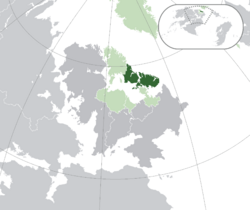Rosland-Iskrell: Difference between revisions
No edit summary |
No edit summary |
||
| (4 intermediate revisions by 2 users not shown) | |||
| Line 3: | Line 3: | ||
{{Infobox country | {{Infobox country | ||
|micronation = | |micronation = | ||
|conventional_long_name = | |conventional_long_name = Kingdom of Rosland-Iskrell | ||
|native_name = '' | |native_name = ''Kongeriget Rosland-Iskrona'' ({{wpl|Danish language|Iskron}}) <br> ''Konungariket Rosland-Iskrellen'' ({{wpl|Swedish language|Roskan}}) | ||
|common_name = Rosland-Iskrell | |common_name = Rosland-Iskrell | ||
|status = | |status = | ||
| Line 31: | Line 31: | ||
|capital = [[Ornsholt]] | |capital = [[Ornsholt]] | ||
|largest_city = capital | |largest_city = capital | ||
|official_languages = {{wpl|Danish language| | |official_languages = {{wpl|Danish language|Iskron}}<br>{{wpl|Swedish language|Roskan}} | ||
|national_languages = | |national_languages = | ||
|regional_languages = | |regional_languages = | ||
| Line 40: | Line 40: | ||
|languages2 = | |languages2 = | ||
|languages2_sub = | |languages2_sub = | ||
|ethnic_groups = 53.2% {{wpl|Danish language| | |ethnic_groups = 53.2% {{wpl|Danish language|Iskron}} <br> 41.3% {{wpl|Swedish language|Roskan}} <br> 5.5% other | ||
|ethnic_groups_year = 2023 | |ethnic_groups_year = 2023 | ||
|ethnic_groups_ref = | |ethnic_groups_ref = | ||
| Line 46: | Line 46: | ||
|religion_year = 2023 | |religion_year = 2023 | ||
|religion_ref = | |religion_ref = | ||
|demonym = Roskan- | |demonym = Roskan-Iskron<br>{{wpl|Danish language|Iskron}}<br>{{wpl|Swedish language|Roskan}} | ||
|government_type = {{wpl|Federal parliamentary | |government_type = {{wpl|Federalism|Federal}} {{wp|Parliamentary system|parliamentary}} {{wp|consitutional monarchy}} | ||
|leader_title1 = [[ | |leader_title1 = [[Monarch of Rosland-Iskrell|King]] | ||
|leader_name1 = [[ | |leader_name1 = [[Gregers VI]] | ||
|leader_title2 = [[Prime Minister of Rosland-Iskrell|Prime Minister]] | |leader_title2 = [[Prime Minister of Rosland-Iskrell|Prime Minister]] | ||
|leader_name2 = [[Casper Öberg]] | |leader_name2 = [[Casper Öberg]] | ||
| Line 129: | Line 129: | ||
}} | }} | ||
'''Rosland-Iskrell''' ({{wpl|Danish language| | '''Rosland-Iskrell''' ({{wpl|Danish language|Iskron}}: ''Rosland-Iskrona'', {{wpl|Swedish language|Roskan}}: ''Rosland-Iskrellen''), officially the '''Kingdom of Rosland-Iskrell''' ({{wpl|Danish language|Iskron}}: ''Kongeriget Rosland-Iskrona'', {{wpl|Swedish language|Roskan}}: ''Konungariket Rosland-Iskrellen''), is a {{wp|Sovereign state|sovereign state}} located in [[Svalland]] in [[Calesia|Northern Calesia]]. It lies between the [[North Sea (Teleon)|North Sea]] to the north, [[Waldrich]] to the west, and the [[Swarin Sea]] and [[East Ruthen]] to the south. Remote [[Kongerikøen Island]], located in the [[Medan Ocean|South Medan Ocean]], is a {{wpl|dependency}} of Rosland-Iskrell. The {{wp|capital city|capital}} and largest city in Rosland-Iskrell is [[Ornsholt]]. | ||
Roskarn-Iskrona was part of the [[Waldrich|Waldic Empire]] from the 9th century until the early 11th century. Following the [[sack of Sydenham]] in 1031, the Empire transitioned into a loose defensive alliance called the [[Waldrich|Old Waldish Confederacy]]. This Confederacy remained largely untouched until the [[Catabole]] in the mid-14th century. During the [[!Reformation]], most of the Roskans and Iskronish embraced [[Presterism]]. In 1472, Presterist nobles launched [[X|a rebellion]] against the repression from [[Alsvik]], igniting a continental war that ultimately led to Waldrich's defeat. In the aftermath, nobles from [[Roskarn]] and [[Iskrona]] swiftly formed a {{wpl|personal union}} under King [[Olaf I of Iskrona]]. This kingdom, alongside the [[Ruthish Confederation]], became one of the few major Presterist powers in [[Calesia]] and even established a small colony in [[Elia Australis]]. The kingdom also established a modest colonial empire in [[Hylasia]], however maintaining low influence in Calesia. {{wp|Industrialization}} progressed slowly, and increasing tensions between the Presterist elite and the emerging labor class led to growing internal divisions. | Roskarn-Iskrona was part of the [[Waldrich|Waldic Empire]] from the 9th century until the early 11th century. Following the [[sack of Sydenham]] in 1031, the Empire transitioned into a loose defensive alliance called the [[Waldrich|Old Waldish Confederacy]]. This Confederacy remained largely untouched until the [[Catabole]] in the mid-14th century. During the [[!Reformation]], most of the Roskans and Iskronish embraced [[Presterism]]. In 1472, Presterist nobles launched [[X|a rebellion]] against the repression from [[Alsvik]], igniting a continental war that ultimately led to Waldrich's defeat. In the aftermath, nobles from [[Roskarn]] and [[Iskrona]] swiftly formed a {{wpl|personal union}} under King [[Olaf I of Iskrona]]. This kingdom, alongside the [[Ruthish Confederation]], became one of the few major Presterist powers in [[Calesia]] and even established a small colony in [[Elia Australis]]. The kingdom also established a modest colonial empire in [[Hylasia]], however maintaining low influence in Calesia. {{wp|Industrialization}} progressed slowly, and increasing tensions between the Presterist elite and the emerging labor class led to growing internal divisions. | ||
Roskarn-Iskrona, a staunch ally of Waldrich, swiftly joined the [[Transmedan Powers]] at the start of the [[Great War (Teleon)|Great War]] and was soon [[Operation X|invaded]] by [[Kingdom of Ruthen|Ruthish]] forces, leading to [[Ruthish occupation of Roskarn-Iskrona|a brutal five-year conflict]]. The tide turned in 1938 with the [[Liberation of Ornsholt|liberation of the capital]] in August, and by late 1939, Ruthish forces were fully expelled. The nation has remained a loyal ally of Waldrich, playing an increasingly active role in {{wp|international politics}} after the Great War. It has participated in the [[Chaibian War]] and contributed to the [[United Congress Monitoring Authority for Ruthen|UCMAR peacekeeping force]]. Economically, Roskarn-Iskrona began to prosper significantly in the 1970s, when {{wp|oil}} began to be pumped from the [[North Sea]]. The country assembled a sizable {{wp|state-owned company}} sector relatively quickly to support the state economy, and the country's {{wp|standard of living}} began to rise. | |||
[ | Rosland-Iskrell is a {{wpl|Federalism|Federal}} {{wp|Parliamentary system|parliamentary}} {{wp|consitutional monarchy}}, the current monarch being [[Gregers VI]]. The nation is a member of the [[United Congress]] and the [[Nordbund]]. | ||
[ | |||
== Etymology == | == Etymology == | ||
Latest revision as of 18:50, 26 October 2024
This article is incomplete because it is pending further input from participants, or it is a work-in-progress by one author. Please comment on this article's talk page to share your input, comments and questions. Note: To contribute to this article, you may need to seek help from the author(s) of this page. |
Kingdom of Rosland-Iskrell | |
|---|---|
| Motto: Vi står fast ("We stand firm") | |
| Anthem: "Nordmarch" "Norra Marsch" "Northern March" | |
 | |
| Capital and largest city | Ornsholt |
| Official languages | Iskron Roskan |
| Ethnic groups (2023) | 53.2% Iskron 41.3% Roskan 5.5% other |
| Religion (2023) | 63.4% Gregorianism 32.5% Irreligious 4.1% Others |
| Demonym(s) | Roskan-Iskron Iskron Roskan |
| Government | Federal parliamentary consitutional monarchy |
• King | Gregers VI |
| Casper Öberg | |
| Ulf Mørk | |
| Irma Hagström | |
| Legislature | Folkemødet |
| Establishment | |
• TBA | TBA |
• TBA | TBA |
• TBA | TBA |
• TBA | TBA |
• TBA | TBA |
• TBA | TBA |
| Area | |
• Total | 285,049 km2 (110,058 sq mi) |
• Water (%) | 3.8 |
| Population | |
• 2024 estimate | |
• 2022 census | |
• Density | 169.1/km2 (438.0/sq mi) |
| GDP (PPP) | 2022 estimate |
• Total | |
• Per capita | |
| GDP (nominal) | 2022 estimate |
• Total | |
• Per capita | |
| Gini (2022) | medium |
| HDI (2022) | very high |
| Currency | Pund (RIP) |
| Time zone | UTC±0 |
| Date format | dd-mm-yyyy |
| Driving side | left |
| Calling code | +38 |
| Internet TLD | .ri |
Rosland-Iskrell (Iskron: Rosland-Iskrona, Roskan: Rosland-Iskrellen), officially the Kingdom of Rosland-Iskrell (Iskron: Kongeriget Rosland-Iskrona, Roskan: Konungariket Rosland-Iskrellen), is a sovereign state located in Svalland in Northern Calesia. It lies between the North Sea to the north, Waldrich to the west, and the Swarin Sea and East Ruthen to the south. Remote Kongerikøen Island, located in the South Medan Ocean, is a dependency of Rosland-Iskrell. The capital and largest city in Rosland-Iskrell is Ornsholt.
Roskarn-Iskrona was part of the Waldic Empire from the 9th century until the early 11th century. Following the sack of Sydenham in 1031, the Empire transitioned into a loose defensive alliance called the Old Waldish Confederacy. This Confederacy remained largely untouched until the Catabole in the mid-14th century. During the !Reformation, most of the Roskans and Iskronish embraced Presterism. In 1472, Presterist nobles launched a rebellion against the repression from Alsvik, igniting a continental war that ultimately led to Waldrich's defeat. In the aftermath, nobles from Roskarn and Iskrona swiftly formed a personal union under King Olaf I of Iskrona. This kingdom, alongside the Ruthish Confederation, became one of the few major Presterist powers in Calesia and even established a small colony in Elia Australis. The kingdom also established a modest colonial empire in Hylasia, however maintaining low influence in Calesia. Industrialization progressed slowly, and increasing tensions between the Presterist elite and the emerging labor class led to growing internal divisions.
Roskarn-Iskrona, a staunch ally of Waldrich, swiftly joined the Transmedan Powers at the start of the Great War and was soon invaded by Ruthish forces, leading to a brutal five-year conflict. The tide turned in 1938 with the liberation of the capital in August, and by late 1939, Ruthish forces were fully expelled. The nation has remained a loyal ally of Waldrich, playing an increasingly active role in international politics after the Great War. It has participated in the Chaibian War and contributed to the UCMAR peacekeeping force. Economically, Roskarn-Iskrona began to prosper significantly in the 1970s, when oil began to be pumped from the North Sea. The country assembled a sizable state-owned company sector relatively quickly to support the state economy, and the country's standard of living began to rise.
Rosland-Iskrell is a Federal parliamentary consitutional monarchy, the current monarch being Gregers VI. The nation is a member of the United Congress and the Nordbund.

